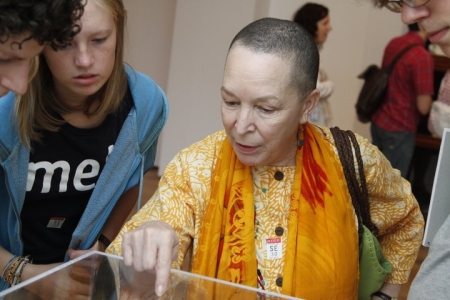'How Theater for Young People Could Save the World' (Lauren Gunderson, USA)
March 20th is World Theater for Children and Young People Day. Some of you might be thinking, "Oh lord, why do we need a day to celebrate actors being silly, wearing bright colors and singing obnoxiously at squirming kiddos and bored parents?"
But if you think that's what Theatre for Young People is, you're missing out on truly powerful, hilarious, bold, engaging, surprising theater that might just save the world.
Around the world artists are creating a new stripe of Theatre for Young People that combines the elegance of dance, the innovation of devised theater, the freshness of new plays, the magnetism of puppetry and the inciting energy of new musicals. Kids have access to more and more mature theatrical visions premiering from Washington, D.C.'s Kennedy Center to Atlanta's Synchronicity Theatre to San Francisco's Handful Players to Ireland to Adelaide to Kosovo to Cape Town.
'Every day, I Go To Work To Play' (Dave Brown, Australia)
Every day I go to work to play. What am I?
I’m a theatre director for Patch Theatre Company in Adelaide, Australia. We create and produce theatre for 4-8 year olds. It’s a good as any job I can imagine. 
I’ve had the pleasure of seeing Patch Theatre productions enjoyed by hundreds of thousands of children in places like Japan, Korea, Singapore, USA, New Zealand, Canada and all over Australia and I’m amazed at how universal children’s responses are to our shows. If ever anyone questions me on the future of theatre, I invite them to sit in an audience of 4-8 year olds and be amazed! Children respond to good theatre experiences with such immediacy, joy and exuberance, you can’t doubt its power and impact.
'Don't Write What You Assume', (Karen Jeynes, South Africa)
'The Theatre of Children and Children's Theatre' (Cristina Gottfridsson, Sweden)
'Reviving a Teenage Audience in a New Way: The “Schoolyard Stories” Project of Iberoamerica' (Maria Ines Falconi, Argentina)
Writers workshop at the first ASSITEJ India National Conference, August 2011
The 1st National Conference on TYA was a unique event in India attended by over 150 theatre persons, writers, educators and parents from all over India, as well as eight guests from abroad. Together they debated, networked and suggested ways of strengthening TYA throughout the country. A special feature of the Conference was the writers’ workshop, designed for writers/directors to explore the raw materials for playwriting, in keeping with the needs of their young audiences.

'Crawling With Monsters - a bilingual piece for both sides of the US/Mexican border' (Jenny Anne Koppera, USA)
Playwright David Megarrity captures the lives of young people in Brisbane using Verbatim Theatre
Verbatim theatre is a modern form of documentary theatre in which the playwright uses the real words of interviewees to construct a play. Like its theatrical forebears, such as the 'Living Newspapers' produced by the Federal Theatre Project in the US in the 1930s, it is often associated with coverage of current events and controversial political issues. Black Watch, by Gregory Burke, portrayed British soldiers in Iraq in their own words, while David Hare's The Permanent Way documented the privatization of the UK railways.
But what about using verbatim theatre as a form to capture the lives of young people in their own words? David Megarrity is doing just that with students at the Queensland University of Technology, developing a play around the theme of ‘love, adrenaline and transitions’.
A Most Creative Collision: Playwright Pearl Cleage riffs on her encounter with 21 teens during the Alliance Theatre’s ‘Collision Project’
For the past 10 years, the Alliance Theater in Atlanta, Georgia has chosen 20–24 teens to participate in a summer high school playwriting program envisioned by Artistic Director Susan V. Booth and entitled 'The Collision Project." 
The young people extract what is interesting and meaningful within the classic text and create their own play in response to the original work.
The source text may be a play, a novel, a poem, a speech or any other written word that is considered “classic”.
'Puppet Power: childhood, puppets, and writing for young audiences and adults'
 Playwright Amaranta Leyva and puppets go WAY back.
Playwright Amaranta Leyva and puppets go WAY back.
Her parents founded the Marionetas de la Esquina before she was born, so puppets have always been a part of her life, in the plays she writes for the company, in plays she writes for children and for adults.
Check out the article in the Toronto Star on line
